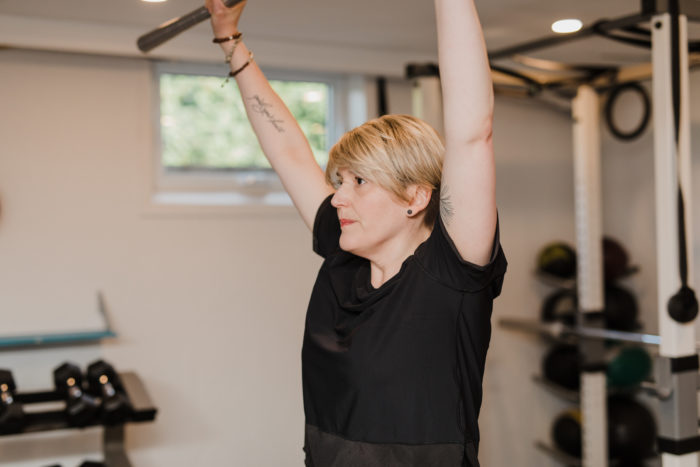How I set goals for 2018
January 4, 2018 11:32 pm / Posted in ArticlesDuring my two-week break, I’ve been doing a lot of thinking about how to set goals for myself in 2018. I would like to share with you what I have found to work best for myself and my clients. What we are striving towards is identifying and setting goals that contribute to our overall happiness, and to do this, those goals need to align with our dreams. Following our goals will be more joyful and therefore easier to achieve, if we are actually following our dreams.

We’ve reached one of the busiest times of the year in the fitness industry: the transition from the old body to the new one. It is the oldest cliche in the industry that the New Year’s Resolutioners will fall off track within a month or two. It’s getting to the point where people no longer set goals in the new year, because they so often fail. I don’t agree with this approach. I really like the ritual of reflecting each January on how our lives are going and the direction we’d like to take them in the new year.
The reason so many of our goals never get achieved , is not because it is a waste of time to set goals, it’s because we are just not setting good enough goals.
Today I would like to change that for you.
How do I set achievable goals?
In The How of Happiness, Sonja Lyubomirsky describes productive (and happy) goal setting. She writes, “The pursuit of goals that are intrinsic, authentic, approach-oriented, harmonious, activity-based, and flexible will deliver more happiness than the pursuit of goals that are extrinsic, inauthentic, avoidance-oriented [or negative], conflicting, circumstance-based, or rigid.”
Let’s look at each of these qualities a little more closely. The best goals will be:
- Intrinsic. Good goals come from inside you, not from an outside source. It’s the difference between acting because you want to and because you have to. An extrinsic goal is one you pursue simply to please others. We want to avoid setting extrinsic goals.
- Authentic. When our goals align with our values and personality, we are happier, healthier, and will work harder to achieve them. If we set an inauthentic goal -such as winning a race when we are really not a competitive person- we will be unlikely to enjoy it’s pursuit, and less likely to achieve it.
- Positive. A good goal helps you pursue a desirable outcome instead of avoiding an undesirable one. For example, a resolution can usually be framed as an positive goal such as “to be fit” or a negative one like “not to be fat”. Positive goals make us happier and yield better results.
- Harmonious. All of your goals should complement each other rather than be in conflict. In this way, they can work together to make each one easier to achieve. Conflicting goals cause frustration and stress. It wouldn’t make much sense to resolve to take baking classes when you have also set a goal to avoid sweets.
- Flexible. We want our goals to evolve over time and to change as our circumstances change. An inflexible goal, such as achieving a certain bench press, must be abandoned if we sustain a shoulder injury. Set goals that can alter direction when priorities change.
- Activity-based. Goals that involve doing rather than getting tend to make people happier and more motivated. We have some control over our activities or habits and less control over our circumstances. Circumstance goals, such as the number on the scale, can be either out-of-reach, or can fade quickly when we do achieve them. You have more control over whether you do something than if you obtain something, so prioritise activity-based goals over circumstance-based ones.
When we are careful to create good goals, we achieve better results. Better results yield even more results, and our dreams can come true right before our eyes.

Your Most Important Goals
Here’s a quick exercise drawn from The How of Happiness.
On a piece of paper, list at least eight of your most meaningful goals, intentions, wishes, dreams, and desires.
Now evaluate each of your goals individually to determine whether it is
- intrinsic or extrinsic
- authentic or inauthentic
- positive or negative
- harmonious or conflicting
- flexible or rigid
- activity-based or circumstance-based
Good goals will have more of the qualities listed first than the ones listed second. Great goals will have all six of the attributes that lead to happiness and better results.
If your goals don’t align well with Lyubomirsky’s guidelines, now is the time to reflect on them, and yourself, so that 2018 can be the year in which you achieve your dreams.
Burke’s 8 most meaningful goals for 2018
| Goal | Intrinsic | Authentic | Positive | Harmonious | Flexible | Activity-based |
| Cook healthy dinners | ✔ | ✔ | ✔ | ✔ | ✔ | ✔ |
| Walk kids to school | ✔ | ✔ | ✔ | ✔ | ✔ | |
| Weigh 172 lbs | ✔ | ✔ | ||||
| Kickboxing twice per wk | ✔ | ✔ | ✔ | ✔ | ✔ | ✔ |
| Read before bed | ✔ | ✔ | ✔ | ✔ | ✔ | ✔ |
| family game night | ✔ | ✔ | ✔ | ✔ | ✔ | ✔ |
| Organize the utility room | ✔ | ✔ | ✔ | ✔ | ✔ | ✔ |
| Eat Less Carbs | ✔ | ✔ |
Category: Articles
Posted by Burke
